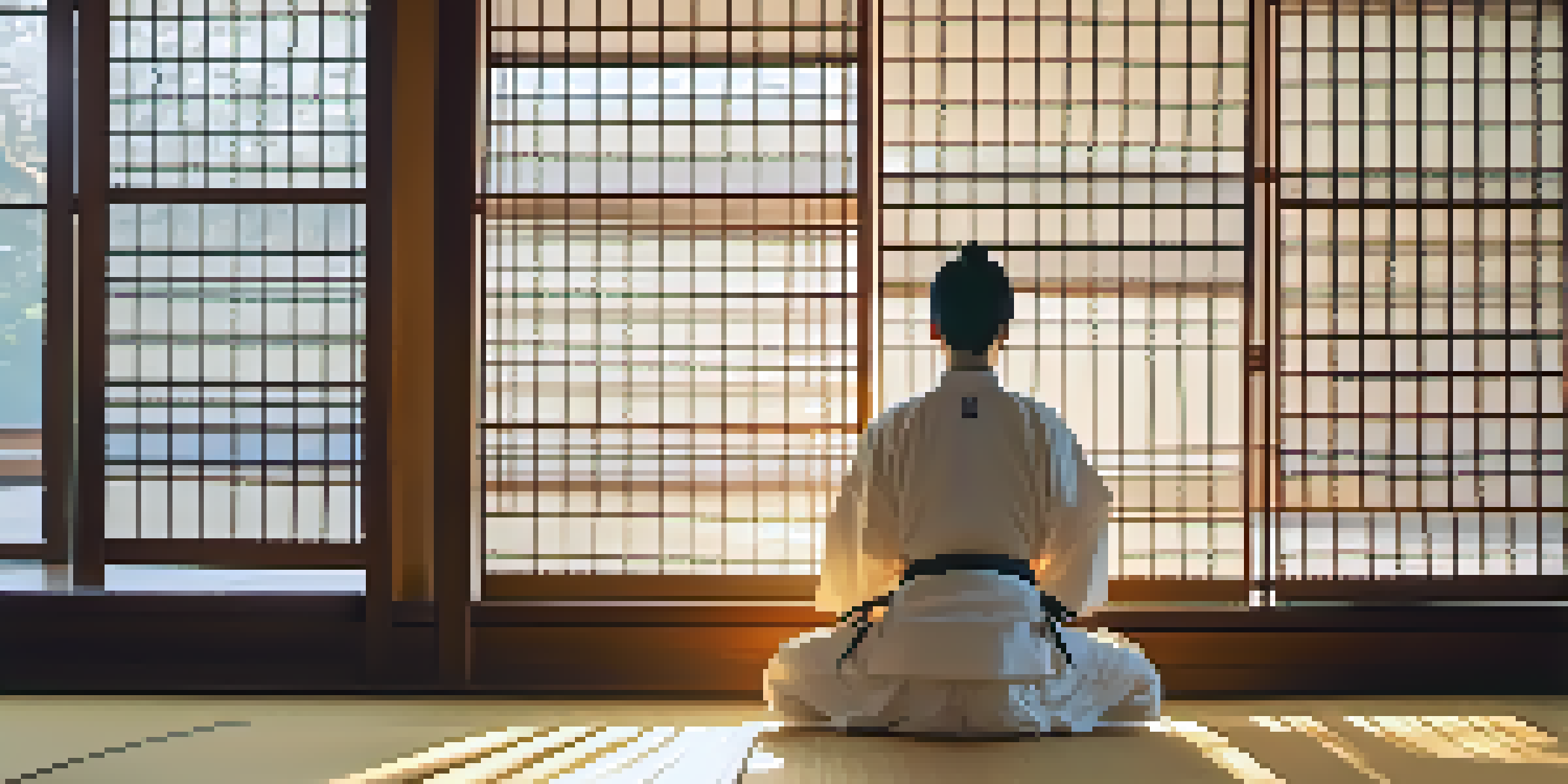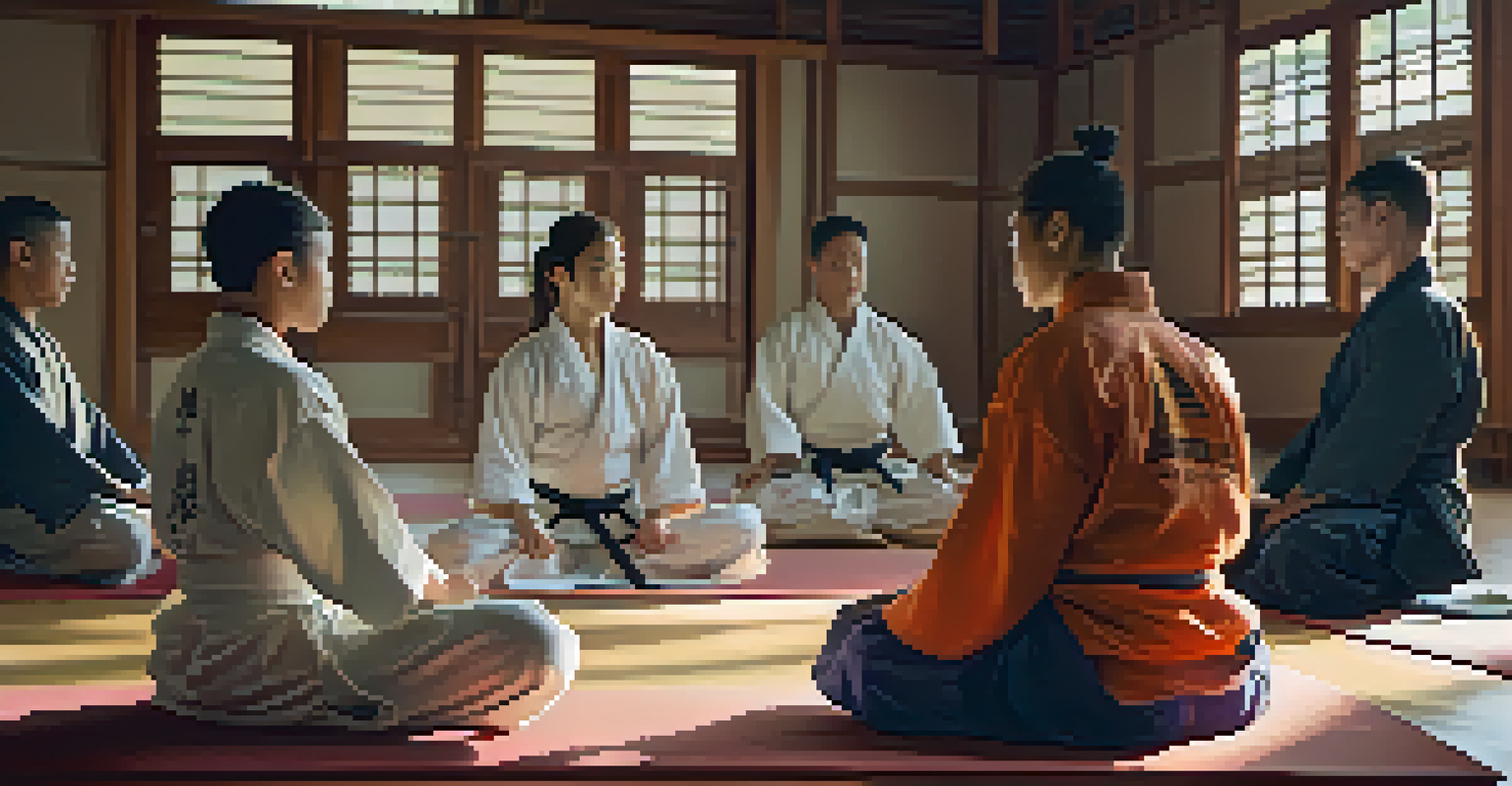Mindfulness in Martial Arts: Enhancing Leadership Potential

Understanding Mindfulness in Martial Arts
Mindfulness in martial arts is about being present in the moment, focusing entirely on your movements and surroundings. This practice encourages practitioners to connect their mind and body, enhancing overall awareness. When you step onto the mat or into the dojo, every punch, kick, and breath becomes an opportunity to cultivate this awareness, which can be transferred to leadership roles.
Mindfulness isn’t difficult. What’s difficult is to remember to be mindful.
For example, when a martial artist practices a kata, they must concentrate on each motion, allowing them to reflect on their intentions and actions. This level of focus not only improves their technique but also fosters a deep understanding of their capabilities. As individuals learn to be mindful of their physical actions, they also develop a greater awareness of their mental and emotional states.
Incorporating mindfulness into martial arts training can lead to improved concentration, emotional regulation, and resilience—all crucial qualities for effective leadership. As practitioners become more attuned to themselves, they can better navigate challenges both in and out of the dojo.
The Connection Between Mindfulness and Leadership
Leadership requires a blend of self-awareness, empathy, and decision-making skills, all of which can be honed through mindfulness. By being fully present, leaders can better understand their own motivations and the needs of their team. This heightened awareness allows for more thoughtful decision-making, fostering a positive impact on group dynamics.

Consider a martial arts instructor leading a class. Their ability to remain calm and focused can significantly influence their students’ learning environment. When they practice mindfulness, they can better respond to the needs of their students, which translates to a more effective and supportive leadership style.
Mindfulness Enhances Leadership Skills
Practicing mindfulness in martial arts fosters self-awareness and emotional intelligence, which are essential qualities for effective leadership.
In essence, the principles of mindfulness in martial arts can guide leaders toward a more authentic approach. By cultivating a clear mind and compassionate heart, they can inspire trust and cooperation in their teams, ultimately enhancing overall performance.
Developing Emotional Intelligence Through Practice
Martial arts training often involves facing physical and mental challenges, which can serve as a catalyst for developing emotional intelligence. Mindfulness practices encourage individuals to observe their emotions without judgment, allowing for greater emotional regulation. This self-awareness is fundamental for leaders who must navigate their own feelings and those of their team.
The mind is everything. What you think you become.
Imagine a martial artist who experiences frustration during a sparring session. Instead of reacting impulsively, mindfulness teaches them to pause, breathe, and assess the situation. This practice enables leaders to remain composed under pressure, making more effective decisions rather than responding emotionally.
As emotional intelligence grows through mindful practice, leaders become more adept at handling conflict and fostering a positive team culture. They learn to empathize with others, leading to stronger relationships and a more cohesive team environment.
Enhancing Focus and Concentration in Leadership
Focus and concentration are vital attributes for effective leadership, and martial arts training inherently promotes these skills. By engaging in mindfulness exercises, martial artists learn to direct their attention fully to their tasks, minimizing distractions. This ability to concentrate can be a game-changer for leaders managing multiple responsibilities.
For instance, during a belt promotion, a student must focus on their performance to demonstrate their skills effectively. This practice of sustained attention not only helps them succeed but also teaches them the importance of focus in achieving their goals. Leaders who practice mindfulness can bring this same level of concentration to their work, leading to improved outcomes.
Resilience Through Mindful Training
Martial arts training develops resilience by encouraging individuals to embrace challenges and learn from failure.
Moreover, enhanced focus allows leaders to listen actively to their team members, fostering an environment where ideas and feedback are valued. This engagement can lead to innovative solutions and a more dynamic workplace culture.
Building Resilience Through Mindful Training
Resilience is a crucial quality for leaders, especially when facing setbacks or challenges. Martial arts training often involves overcoming obstacles, whether physical or mental, which cultivates a resilient mindset. Mindfulness enhances this process by teaching individuals to accept difficulties as part of their journey.
Picture a martial artist who fails to execute a technique perfectly during training. Instead of feeling defeated, they practice mindfulness to analyze what went wrong, learn from the experience, and try again. This approach of embracing failure as a learning opportunity is essential for leaders who encounter challenges in their roles.
By fostering resilience through mindful practice, leaders can inspire their teams to adopt a similar mindset. This collective resilience can be a powerful force, enabling teams to navigate challenges with confidence and determination.
Fostering Team Collaboration and Unity
Martial arts training often emphasizes the importance of working together, whether during partner drills or team competitions. Mindfulness can enhance this collaborative spirit by promoting open communication and mutual respect among team members. Leaders who practice mindfulness can create an environment where collaboration flourishes.
When martial artists train together, they develop a sense of camaraderie that extends beyond the dojo. This shared experience fosters trust and encourages team members to support one another, which is essential for effective teamwork. Leaders who embody these principles can cultivate a similar atmosphere within their organizations.
Boosting Team Collaboration
Mindfulness promotes open communication and mutual respect, creating a collaborative environment essential for effective teamwork.
By modeling mindfulness and collaboration, leaders can inspire their teams to work together harmoniously. This unity leads to improved problem-solving and a greater sense of belonging among team members, enhancing overall morale.
Applying Mindfulness in Everyday Leadership
Integrating mindfulness into daily leadership practices doesn’t require a complete overhaul of one’s routine. Simple techniques, such as taking mindful pauses or practicing deep breathing, can significantly enhance a leader’s effectiveness. By incorporating these moments of mindfulness, leaders can approach their work with a clearer mind and a calmer demeanor.
For example, a leader might start each meeting with a brief moment of silence, allowing everyone to center themselves before diving into discussions. This practice can set a positive tone and encourage active participation from all team members. It creates a space where everyone feels heard and valued, which is essential for effective collaboration.

Ultimately, the journey to becoming a more mindful leader is ongoing. By consistently applying these practices, leaders can not only enhance their own skills but also inspire their teams to embrace mindfulness, creating a ripple effect throughout the organization.